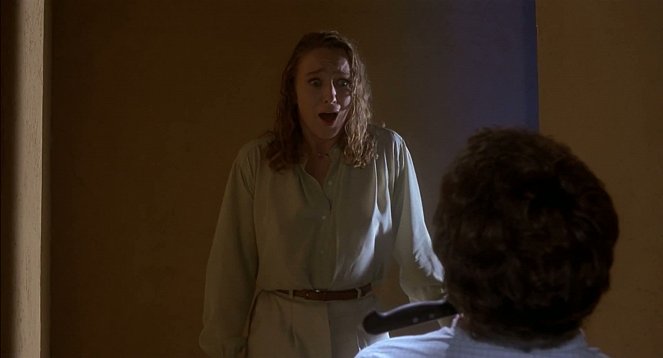Rendező:
Dario ArgentoForgatókönyvíró:
Dario ArgentoOperatőr:
Romano AlbaniZeneszerző:
Keith EmersonSzereplők:
Leigh McCloskey, Irene Miracle, Eleonora Giorgi, Daria Nicolodi, Sacha Pitoëff, Alida Valli, Gabriele Lavia, Dario Argento, Paolo Paoloni, Ania Pieroni (több)Tartalmak(1)
„Én, Varelli, londoni építész találkoztam a Három Anyával és három házat építettem nekik. Egyet Rómában, egyet New Yorkban és egyet a németországi Freiburgban. Mire rádöbbentem az igazságra, már túl késő volt... Ők hárman házaikból könnyeket és sötétséget bocsátottak a világra. A Sötétség Anyja, aki hármuk közül a legfiatalabb és leggonoszabb, New Yorkban vette át az uralmat." – szól az alkimista vallomása. Rose Elliot egy patinás New York-i házban bérel lakást és nyugtalanító érzések tartják hatalmukban. Levélben kér segítséget bátyjától, Marktól. Bár Mark sietve New York-ba érkezik, húgát olyan erők kerítették hatalmukba, amelyekkel szemben ember nem győzedelmeskedhet...Dario Argento, a Horror Nagymesterének klasszikusa digitálisan felújított képpel és hanggal, valamint számos érdekes extra kíséretében kerül bemutatásra. (Fantasy Film)
(több)Recenziók (7)
Dario Argento megszokottan álomszerű, vizuálisan elegáns horrorfilmje, de ezúttal annyira "történet nélküli", hogy néha elfelejtjük, miről is szól.
()
Although I wholeheartedly endorse Lucio Fulci’s dictum whereby Argento is as adept as a composer of captivating scenes as he is inept as a scriptwriter, I didn’t mind the lack of story arc in this case, because Argento finally resigns himself to trying to shock us (read: annoy us) with a plot twist, presumably concocted for him by the chimpanzee from Phenomena. This one’s strictly about atmosphere and a beautiful color palette. Then again, just between you and me, the last twenty minutes or so, following the rat attack, again suffer from the highly spurious, implausible catastrophe of a script. That’s not something I’d expect to ever happen in a film by the aforementioned Fulci, not to mention Bava, Lenzi or other master directors. Argento is not my cup of tea.
()
Visually, this is probably Argento’s most intoxicating and beautiful film. A surreal atmosphere, beautiful colours and so little of a story that it could fit on a pinhead. I didn’t like Inferno at first, like Suspiria, but a second viewing helped me appreciate it. A piece of advice: if you’re beginning with old horror stuff from Italy, leave Argento’s witch flicks for last. Inferno is really beautiful, but there could really have been at least a little bit more of a plot, hence the four stars.
()
My overall impression is a bit hesitant because Inferno is a considerably uneven film. On one hand, its impressiveness, style, and atmosphere cannot be denied, but on the other, it gives the impression of being confused in many aspects, so confused that I doubted the director's intention - it seems more like the magic of randomness worked. The film resembles a confused dream, a nightmare that troubles us shortly before awakening. A good choice for horror fans, but supporters of a clear plotline and explanatory endings should stay far away from Inferno. Overall impression: 60%.
()
Inferno really has captivating visuals, and some scenes are so ‘beautiful’ they strongly imprint the viewer’s memory. The problem lies in the non-action. Here, a simple theme extends across several episodes, in which the characters are getting slaughtered throughout long and tortuous sequences. But the storyline doesn’t go anywhere. Compared to its predecessor, Inferno also lags behind in terms of actor performance and music. Still, it’s definitely worth seeing.
()
The story is not the currency of this film, but it is the captivating atmosphere that will sweep you along with it. Dario Argento presents unbelievable images, interesting scenes, and often does so without words. He lets you drown in silence, occasionally choosing only ecstatic and nerve-wracking musical accompaniment. He knew very well how to evoke horror, and "Inferno" is just another beautiful example. Interiors and exteriors are used to an unbelievable extent in favor of horror, which somewhat refers to Polanski, but also to gothic horrors. I must at some point finish the entire trilogy to verify if Dario completely lost his power and taste after the year 2000.
()
In his most expensive and most daring film, Dario Argento completely detached himself from reality and created his own phantasmagorical universe in which he gave full rein to his horror fantasies. The interior of the hotel, where most of the action takes place, is architecturally nonsensical and resembles more of a theatre stage, constantly flooded with garishly coloured lights coming from nowhere. The main characters, who change every twenty minutes, are just helpless pawns in the hands of malevolent forces and die in very unlikely, yet visually arresting ways. To evoke a dreamlike logic, Argento even instructed the actors to behave in front of the camera in a way they normally wouldn't. Inferno has been criticized by many for its incoherent and absurd plot, stupid dialogue and terrible acting. Others see it as a remarkable autobiographical dream piece in the tradition of Fellini. According to Argento, it is one of his most honest and purest films, but one that he doesn't have very good memories of. Due to a serious illness, he had to direct some scenes lying down, and was even replaced a few times by the famous Mario Bava, who was in charge of the second crew (he shot, for example, the famous scene in the flooded ballroom). The result is a pure horror symphony whose strength lies in Argento's visual virtuosity, surreal production design and a roaring rock-opera soundtrack.
()

